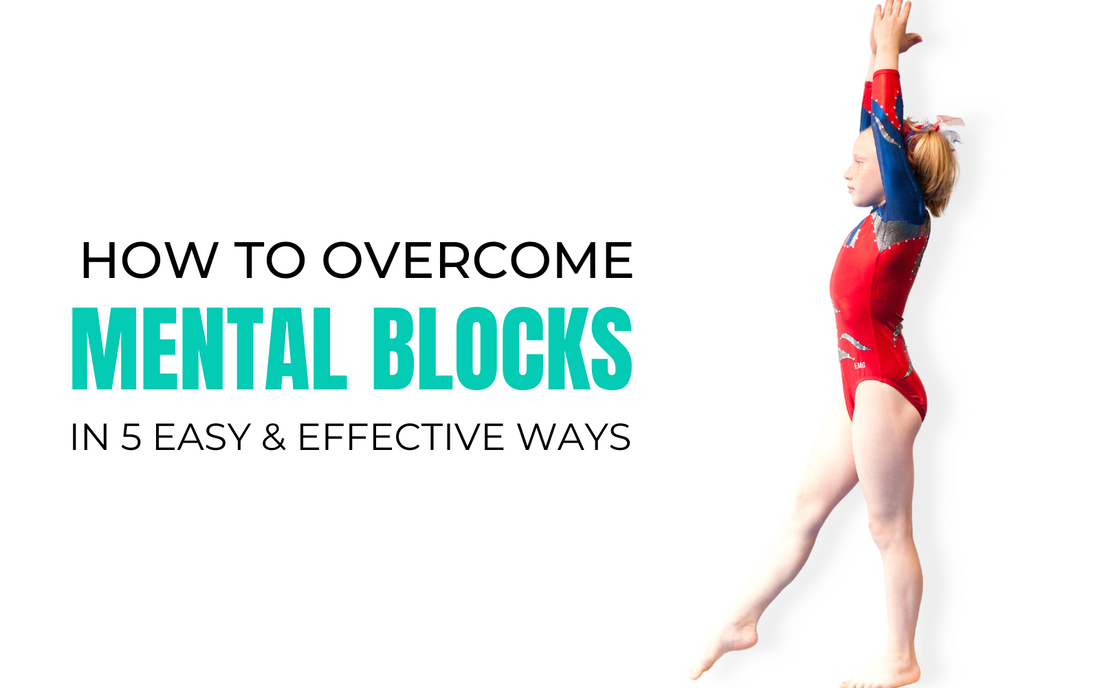Having a mental block can be frustrating and lonely, but you are not alone.. Mental Blocks happen to 70% of high level gymnasts at least once during their gymnastics careers.
To overcome a mental block, it's important to understand what it is. A mental block is a psychological blocking that inhibits you to perform a task or in a gymnasts case a skill which previously would have been easy to complete.
Mental Blocks are most commonly caused after a serious fall or an injury, but sometimes they seem to come out of nowhere and blind side you.. or so you think! It can also occur after seeing another gymnast experience a fall or injury, and the fear of witnessing another gymnast's pain may subconsciously cause a mental block for you!
But it is important to know, however they occurred, mental blocks can be overcome.
The most common skills that gymnasts experience mental blocks with are generally backwards elements, or a sequence of backwards elements, such as a backflip. It usually first presents itself when in a sequence such as a roundoff - backflip - salto on floor, however it will usually spread into the other apparatus such as a backflip or back walkover on beam. (Feigley, Robbins & Berger, 1989)
Research has shown that athletes susceptible to mental blocks are usually :
- Quick Learners: they probably learnt the skill quickly at a young age and didn’t break down the skill enough due to their talent/fast learning.
- Intelligent
Day, Thatcher, Greenlees & Woods (2006)

How the gymnast feels during a mental block:
Gymnasts experiencing mental blocks will often get frustrated at themselves, you will begin to question yourself with “Whats wrong with me”, “Why can't i do this, everyone else can” .. these questions when repeated enough in your own mind will develop into negative thoughts such as “i'm not good enough”.
It is important to not be so hard on yourself, we know this can be extremely difficult but try! Mental blocking although we know the patterns of how they occur, psychologists do not know the root of why they happen.
These negative emotions and negative self appraisals, only add to the issue.
How to overcome a mental block in 5 effective steps:
As a gymnast you spend hours training, conditioning and strengthening your body to prepare it to perform these physically demanding skills, but what about you mind, have you prepared your mind for performing these skills?
1.Take a minute, don't go in a loop:
If you are feeling extremely overwhelmed, scared etc you are not ready to perform the skill, and THAT’S OK!
Take a break, walk away and come back to it, standing and repeatedly trying to force yourself to do the skill, no matter how much you want to do it, when it comes to mental blocks, it's not going to help.
2. Change your approach to the skill:
Sometimes we just have to do things differently. Try changing your progressions, or the way you prepare for it, maybe before you just stretched up and went, but maybe now you need to do something else, like a deep breathe, a dance, waking forward then backwards, whatever it may be, try to change it up.
Sometimes having something else different before the skill, may help.

3.Talk to your coach or a trusted adult:
Your coach should be able to help you, the majority of coaches have experienced mental blocks themselves or have helped other gymnasts overcome them.
Talk to them about helping you break down the skill, having spot or just needing some extra time and encouragement, your coach is supposed to be there to help you be the best gymnast you can be, to support you in your journey and help you overcome obstacles.

4.Practice Mental Imagery:
Now before you roll your eyes at this, it is an extremely effective way of overcoming mental blocks, although it's not easy, it takes time and practice, so just like your gymnastics training, try to find time to practice mental imagery.
- Begin by closing your eyes and taking a few deep breaths.
- Try to visualize yourself completing the skill correctly, over and over again.
- Think about how the skill feels, during each stage. I.e. a backflip think, stretch tall, sit, arm swing, reach, push, together, finish. Use descriptive words as queues for the different stages of the skill.
Try to complete a mental imagery sequence in achievable steps, and make progressions if you need to, maybe you can’t imagine the full skill right now, but maybe you can imagine a simpler version, or the skill with spot, that's ok just work yourself up to it just like you would with the physical skill at training.
Complete between five reps in without missing, then increase it to 10 reps, and continue to increase the reps in your imagery.
5.Use “Ques” when practicing:
Think about how the skill feels, during each stage of the skill.
For example: a backflip, think, stretch tall, sit, arm swing, reach, push, together, finish.
Try to find words that help you through the different stages of the skill, they don't have to make sense to anyone except you, we found that “descriptive” words were most commonly preferred.
We know you will overcome this mental block, it’s temporary,
We hope this helps,
Love,
Aimee & The EMG Team

